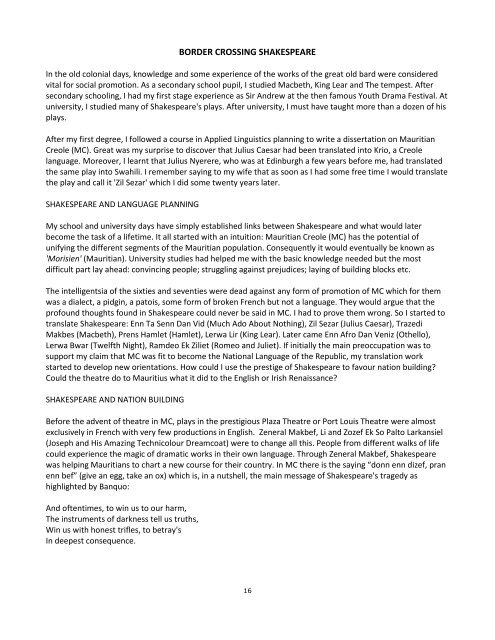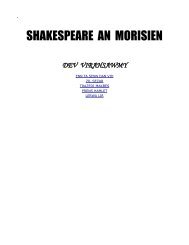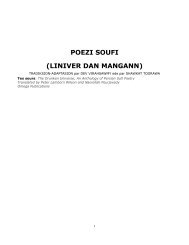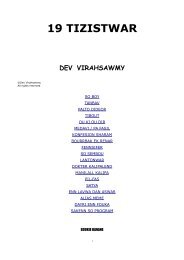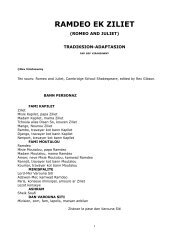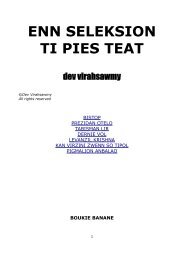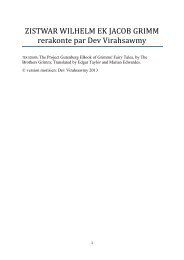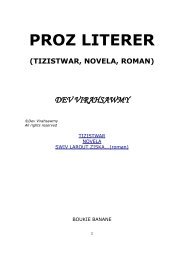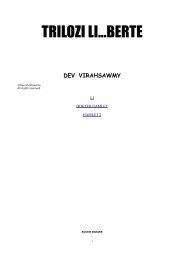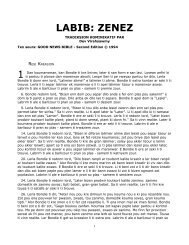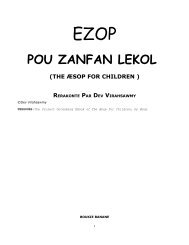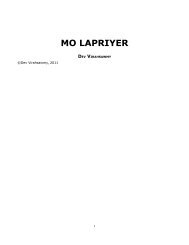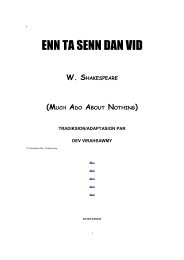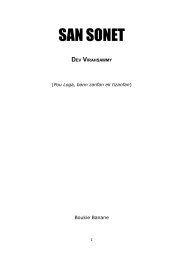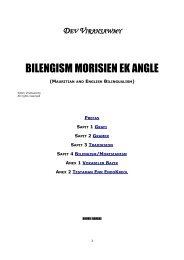LITERESI BILENG AVANSE - boukie banane
LITERESI BILENG AVANSE - boukie banane
LITERESI BILENG AVANSE - boukie banane
Create successful ePaper yourself
Turn your PDF publications into a flip-book with our unique Google optimized e-Paper software.
BORDER CROSSING SHAKESPEARE<br />
In the old colonial days, knowledge and some experience of the works of the great old bard were considered<br />
vital for social promotion. As a secondary school pupil, I studied Macbeth, King Lear and The tempest. After<br />
secondary schooling, I had my first stage experience as Sir Andrew at the then famous Youth Drama Festival. At<br />
university, I studied many of Shakespeare's plays. After university, I must have taught more than a dozen of his<br />
plays.<br />
After my first degree, I followed a course in Applied Linguistics planning to write a dissertation on Mauritian<br />
Creole (MC). Great was my surprise to discover that Julius Caesar had been translated into Krio, a Creole<br />
language. Moreover, I learnt that Julius Nyerere, who was at Edinburgh a few years before me, had translated<br />
the same play into Swahili. I remember saying to my wife that as soon as I had some free time I would translate<br />
the play and call it 'Zil Sezar' which I did some twenty years later.<br />
SHAKESPEARE AND LANGUAGE PLANNING<br />
My school and university days have simply established links between Shakespeare and what would later<br />
become the task of a lifetime. It all started with an intuition: Mauritian Creole (MC) has the potential of<br />
unifying the different segments of the Mauritian population. Consequently it would eventually be known as<br />
'Morisien' (Mauritian). University studies had helped me with the basic knowledge needed but the most<br />
difficult part lay ahead: convincing people; struggling against prejudices; laying of building blocks etc.<br />
The intelligentsia of the sixties and seventies were dead against any form of promotion of MC which for them<br />
was a dialect, a pidgin, a patois, some form of broken French but not a language. They would argue that the<br />
profound thoughts found in Shakespeare could never be said in MC. I had to prove them wrong. So I started to<br />
translate Shakespeare: Enn Ta Senn Dan Vid (Much Ado About Nothing), Zil Sezar (Julius Caesar), Trazedi<br />
Makbes (Macbeth), Prens Hamlet (Hamlet), Lerwa Lir (King Lear). Later came Enn Afro Dan Veniz (Othello),<br />
Lerwa Bwar (Twelfth Night), Ramdeo Ek Ziliet (Romeo and Juliet). If initially the main preoccupation was to<br />
support my claim that MC was fit to become the National Language of the Republic, my translation work<br />
started to develop new orientations. How could I use the prestige of Shakespeare to favour nation building?<br />
Could the theatre do to Mauritius what it did to the English or Irish Renaissance?<br />
SHAKESPEARE AND NATION BUILDING<br />
Before the advent of theatre in MC, plays in the prestigious Plaza Theatre or Port Louis Theatre were almost<br />
exclusively in French with very few productions in English. Zeneral Makbef, Li and Zozef Ek So Palto Larkansiel<br />
(Joseph and His Amazing Technicolour Dreamcoat) were to change all this. People from different walks of life<br />
could experience the magic of dramatic works in their own language. Through Zeneral Makbef, Shakespeare<br />
was helping Mauritians to chart a new course for their country. In MC there is the saying “donn enn dizef, pran<br />
enn bef” (give an egg, take an ox) which is, in a nutshell, the main message of Shakespeare's tragedy as<br />
highlighted by Banquo:<br />
And oftentimes, to win us to our harm,<br />
The instruments of darkness tell us truths,<br />
Win us with honest trifles, to betray's<br />
In deepest consequence.<br />
16


